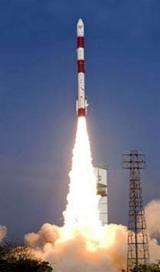File photo shows a satellite being launched in southern India in January 2008. India successfully launched seven satellites including six from foreign countries, officials said, underlining the country's ambitions in the space business.
India successfully launched seven satellites including six from foreign countries on Wednesday, officials said, underlining the country's ambitions in the space business.
About a month after its first moon mission was aborted, the country's space agency announced that the seven satellites had been put into orbit about 720 kilometres (447 miles) above the Earth.
India will use one of the satellites, Oceansat-2, for monitoring ocean patterns and identifying fishing zones, enhancing the capability of the first Oceansat, which was launched in 1999, the agency said.
Of the six foreign satellites, there are four from Germany and one each from Switzerland and Turkey. They are university-funded payloads being used to test new technologies.
"Once again we have proved that we can do the job precisely. The satellites have been placed in the desired orbit at the exact time," said Indian Space Research Organisation (ISRO) chairman G. Madhavan Nair from the spaceport Sriharikota, about 80 kilometres northeast of Chennai.
The cost of the launch was two billion rupees (40 million dollars), including 1.3 billion rupees for the satellite and 700 million rupees for the rocket, ISRO director S. Satish said.
India began its space programme in 1963, developing its own satellites and launch vehicles to cut dependence on overseas agencies.
It first staked its claim to a share of the global commercial launch market by sending an Italian satellite into orbit in 2007 and is keen to use its cost advantage to garner further business.
The Indian satellite will study the role of oceans on the Earth's atmosphere and data beamed back will be used to identify fishing zones, as well as helping with coastal studies, weather forecasting and climate studies.
India put a probe on the moon's surface to great fanfare and national pride late last year, but controllers lost contact with the space vehicle last month and aborted the mission.
(c) 2009 AFP


















